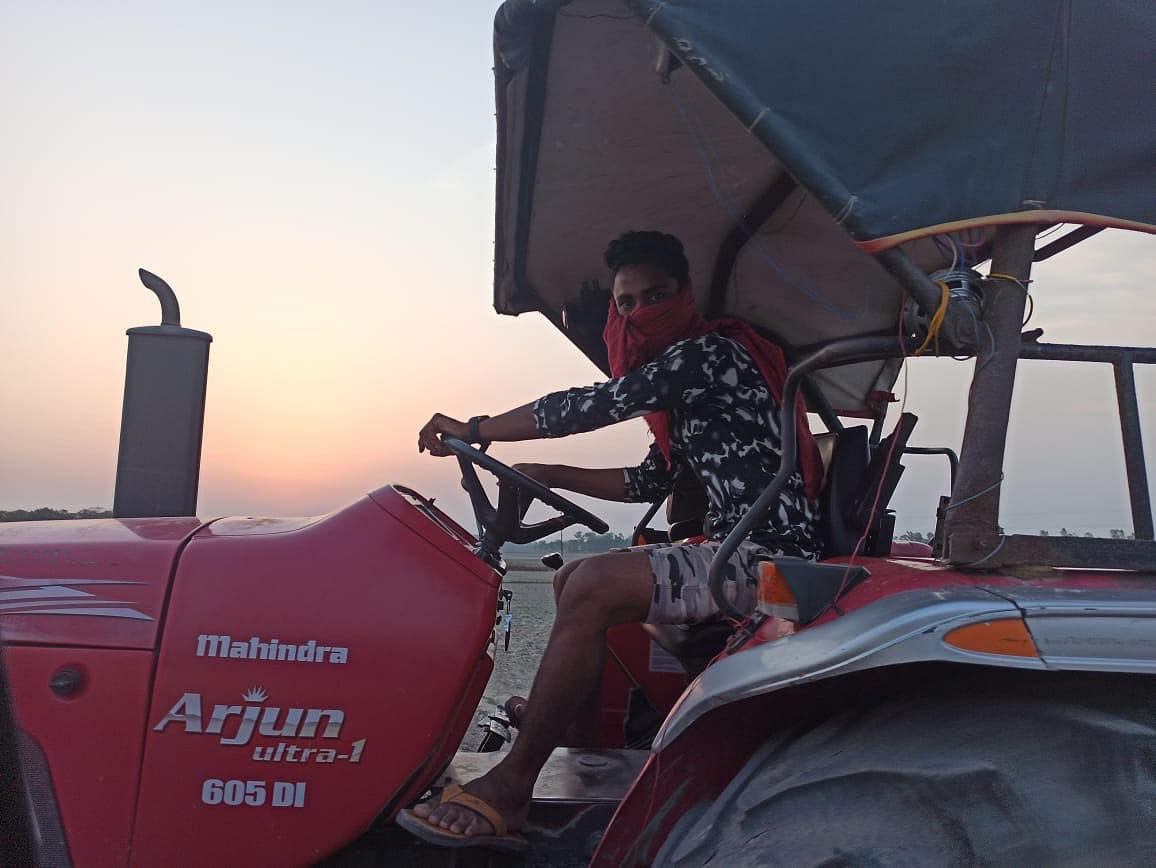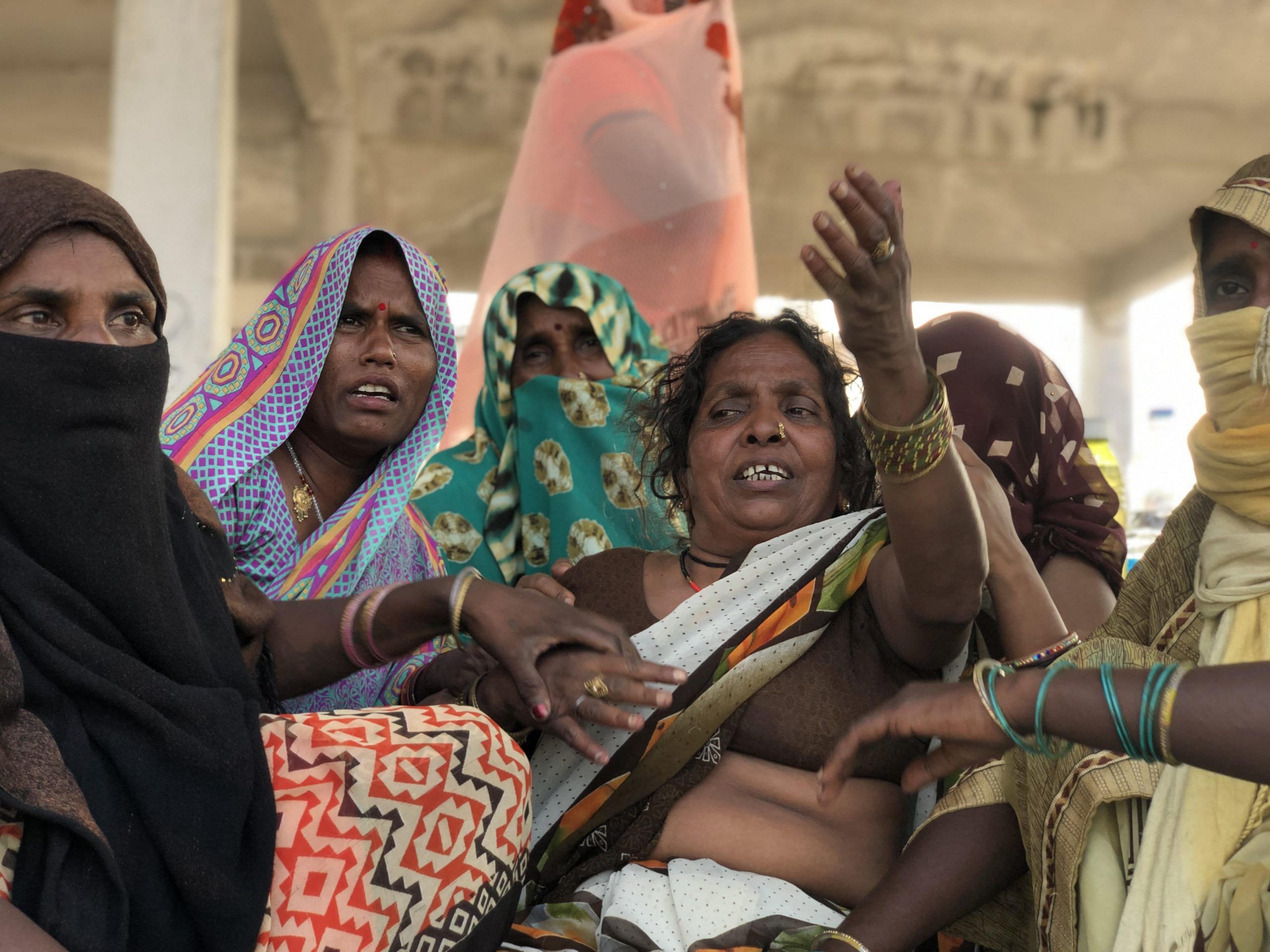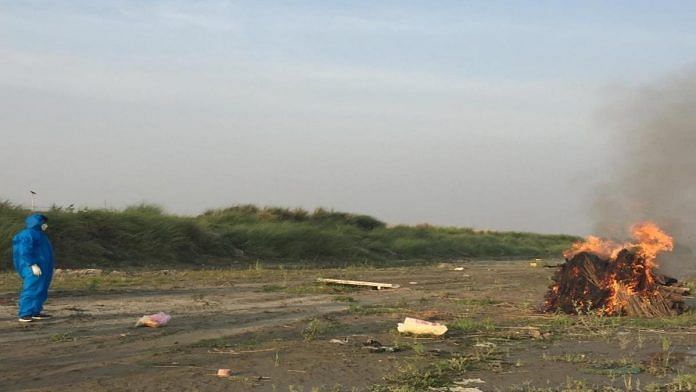Sant Kabir Nagar: Ram Kripal, a 68-year-old migrant labourer who worked at a Mumbai factory, travelled 1,600 km in a truck over four days to reach home in Sant Kabir Nagar, Uttar Pradesh. But before he could traverse the last 30 km to his village, he collapsed and died. Kripal was tested positive for coronavirus a day later.
Kripal was one of the thousands of migrant labourers who have been leaving urban centres like Delhi and Mumbai in droves to escape job loss and uncertainty about livelihoods. Desperate to get home as soon as possible, according to his family, Kripal shunned the special Shramik Express trains launched by the government on 1 May.
Kripal was cremated Tuesday by his son on the banks of the Ghaggar river. In light of precautions adopted amid what were then suspicions that Kripal might be Covid-19 positive, other family members were made to wait a long distance away. It isn’t known yet if Covid-19 was the cause of death.
Also Read: Don’t blame Covid or financial package. Politics is holding India’s migrant workers hostage
‘He was asking for water’
Ram Kripal was among a group of migrant labourers on a truck that dropped them on the Lucknow-Gorakhpur highway Tuesday. The migrants then started out towards the Sant Kabir Nagar District Jail, which is under-construction and a short distance away, for mandatory Covid-19 screening. ThePrint team saw the stream of migrants walking towards the premises while on a visit to the jail.
However, according to eyewitness accounts, Kripal collapsed before he could reach the jail. Local police personnel said he was immediately taken to the district hospital, but declared brought dead.
Kripal had no belongings with him, just a tablet (not known what) and an empty bottle of water. Several eyewitnesses told ThePrint that just before he fainted, Kripal was seen asking around for water.
While he was being taken to hospital, police said, they called up Kripal’s family to inform them. But he had passed away before his son Surinder arrived to tend to him, they added.
Meanwhile, doctors conducted an autopsy and collected a swab for Covid testing. Kripal’s corpse was subsequently put in a body bag for his final journey home to his village, Haiser. ThePrint reporters accompanied the ambulance.
Half way to the village, two police vehicles intercepted the ambulance and redirected it towards the Bhidhar shamshan ghat, a cremation site. Intimated about the change of plans, Kripal’s family arrived in a tractor just in time to see the funeral pyre being lit.

However, only Surinder, clad in Personal Protective Equipment (PPE) gear except the glasses, was allowed near the body. He lit the pyre with the help of two workers of the cremation site, as other family members watched from around 500 metres away. Soon afterwards, he was carted off to quarantine as the remaining family members were sent away.
Widow quarantined too
Kripal had been working at a paint-polish factory in Mumbai, where he had been staying for the last 20 years. He would visit home once a year.
He leaves behind two sons, Surinder and Mahinder, and a daughter, besides his wife. Speaking to ThePrint just after the funeral, Kripal’s wife was still coming to terms with the fact that her husband had passed away.

“He was just 30 km away from home. He called me up around 11 am, after getting down from the truck, and informed me that he is reaching home soon, asked me to wait for him,” she said. “The truck driver also spoke to me and I thanked him for dropping my husband safely. However, a couple of hours later, police called us and told us he was unwell and my eldest son rushed to the hospital,” she added.
“I had warned him (Kripal) to wait for the government to send him home in the Shramik Express, but he didn’t listen… He was in a hurry to come back home,” she said, adding that Kripal died between 1 and 2 pm.
Kripal’s wife has also been placed in quarantine at the isolation ward of the district hospital, along with her other two children, Sant Kabir Nagar district magistrate Ravish Gupta said, adding that this was being done as a measure of “extra precaution”. Their samples have been collected for Covid testing, which will be conducted at BRD hospital in Gorakhpur, which handles all the tests from this area.
In light of Kripal’s death, police are busy trying to track down the people he came in contact with during the journey, including those he travelled with.
“We are tracing people who traveled with him on the truck. We are also tracking his phone calls,” said Sant Kabir Nagar additional superintendent of police Asit Srivastava. “As far as we know, there was a not a single person from his village travelling with him. But many people from the district were returning with him. We will get more information in the evening.”
The total number of people on the truck hasn’t been officially confirmed. According to the Srivastava, three other migrants on the truck, including a child, have been traced and quarantined.
The police officer said the exact cause of Kripal’s death is yet to be determined. “His post-mortem report says he wasn’t on an empty stomach. There were no injuries on his body.”
Also Read: UP migrants reach Hardoi from Punjab by train, but are then told to find their own way home




-The ₹20 lac crore speech-
Thousands of people have written to PM Modi imploring him to stop this macabre tragedy of migration in India during Covid-19. I too wrote to Modiji. But his mind is in the stratosphere of what India should be in the future. He is not worried about the present- women, children, helpless people trudging 100s of kms in the wilderness, or being forced to pay for their train and road journeys. These migrants are not going to come back anytime soon to build bridges and roads. And they need not because he wants them to be ‘vocal for local’! In his 33 minute speech, not a word about the pain of these migrants. He was addressing the middle class and the captains of industry. And foreign investors waiting to invest in India, only if the rights of labour could be crushed and land in villages could be acquired without fuss. So land, labour and laws were emphasised by him. He is not talking to the urban and rural poor (certainly not to the unfortunate migrants) who understand the cycle chain, but perhaps not the global supply chain. A few thousand ₹s in their Jan Dhan accounts would ensure their survival. Life with dignity, a mandate of Article 21 according to Supreme Court (SC), is not for them. That is for the middle class. He is talking of India driving the global supply chain. He is looking at the future, how to repackage the Land Acquisitions and RR Act to get around the principles of fair compensation, resettlement and transparency mandated by the SC. Unfortunately the hyped Bullet Train has been running very late because of these problems. He knows that India is in the forefront of being an assembly-line economy, not a true production and technology driven economy, because our reverse engineering has been negligible, given our poor R&D investment. That is the reason why even the ₹3000 cr Statue of Unity believed to be the biggest symbol of ‘Make in India’, the central focus of the Speech, was largely made in China. He knows that the 20 lac crore package will not change the present or the immediate future. And he is not worried. Such is his cult following! कल सबने देखा है, आज किसने देखा? That could be the story of ache din. And convincing people about that is the mark of a true visionary.
He should not have thus traveled.
These are individual actions and government can do little about this in a democracy.